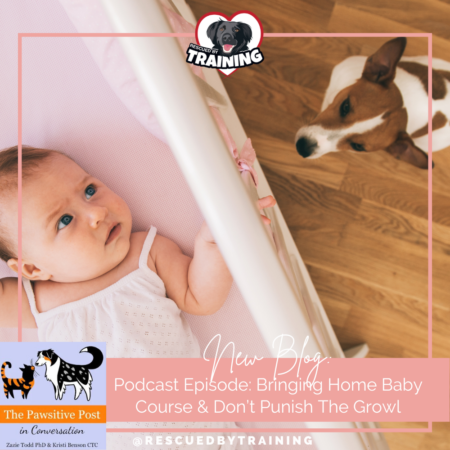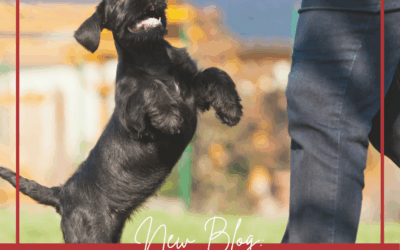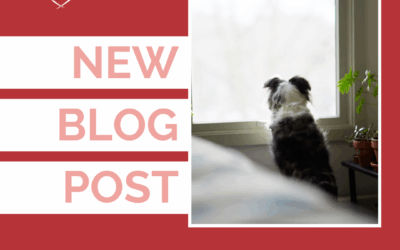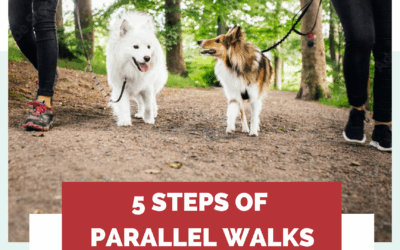A few months ago (before BooBoo passed away…so you will see her in the video if you watch it!) I chatted with Zazie and Kristie from Companion Animal Psychology for their podcast The Pawsitive Post in Conversation about my course, Bringing Home Baby. You can find the episode on Apple, Spotify, The Pawsitive Post website, watch on YouTube or listen wherever you get your podcasts.
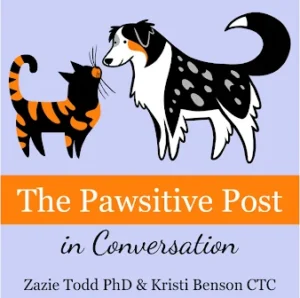 In this episode I have a lovely conversation talking about my course, a little about how I came to work with with families with small children and about some of the top issues expectant families have. And we talk about the importance of not punishing your dog if they growl at your baby and what to do if your dog shows signs of being uncomfortable.
In this episode I have a lovely conversation talking about my course, a little about how I came to work with with families with small children and about some of the top issues expectant families have. And we talk about the importance of not punishing your dog if they growl at your baby and what to do if your dog shows signs of being uncomfortable.
You’re probably thinking “What did you just say? don’t punish or yell at my dog if they growl at my baby? But then how will they know not to do that?”
That’s right. Today I’ll be discussing the important topic of dog body language and the importance of not punishing your dog if or when he growls to communicate he’s uncomfortable or upset. I know, I know, but stick with me.
I get it. Growling can be very upsetting to anyone, but especially a new parents. Often our knee-jerk reaction is to yell “no” to the dog, in an attempt to stop this “undesirable” behavior, especially if our dog is growling at our baby. I’m here to say, even if that’s what you want to do, what I’d like you to do instead is happy talk, and create distance between your dog and baby, and tossing food to your dog, thanking him for clearly communicating he’s upset. I know that feels counterintuitive, like we’re “rewarding bad behavior” but hear me out. We’re not rewarding bad behavior – we’re helping him feel better about a situation that he’s clearly upset by. If your dog growls at your baby, yelling at him for growling is adding more stress to a situation where he’s already upset. What’s he thinking when this happens? Maybe something like “There’s a scary baby and now mom (or dad) is yelling at me – this baby really is bad news!”
One message I like new parents to understand is that your dog doesn’t know your baby came from you or is suddenly part of your family. It can be upsetting when you love your baby and your dog and you can’t understand why your dog doesn’t also love your baby (or toddler, once they start moving). But for many dogs, babies and especially toddlers, are scary. They’re loud, unpredictable, they smell weird, they scream out suddenly – they’re not trusted, predictable, familiar adults. And unless you did a spectacular job socializing your dog during his socialization window (the first 12-14 weeks of his life) to teach him babies and toddlers are safe, chances are, your dog might be afraid of your baby.
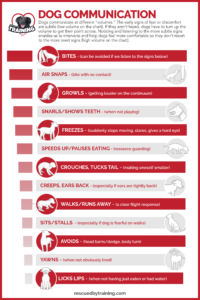 How do dogs communicate when they’re afraid or upset? They can only tell us through their body language. They use their body posture and other forms of dog communication – things like the position of their ears, eyes, tail and muzzle, how their weight is shifted, whether they choose to stay, avoid or freeze and growling, snarling, lip curling or, yes, biting.
How do dogs communicate when they’re afraid or upset? They can only tell us through their body language. They use their body posture and other forms of dog communication – things like the position of their ears, eyes, tail and muzzle, how their weight is shifted, whether they choose to stay, avoid or freeze and growling, snarling, lip curling or, yes, biting.
Dogs very rarely “bite out of nowhere.” More commonly, early warning signs have been ignored, or in some cases, punished. When this happens the dog escalates their communication to be heard. If we punish the dog for growling, we take growling out of his communication toolkit and force him to bite as his only way to tell us he’s upset. If you need some help on understanding dog body language, you can download my free infographic seen here.
So what do you do instead if your dog is growling at your child? First, always ensure safety. Use management like baby gates, tethers and crates to prevent your dog from having access to your baby or toddler until training can be worked on and your dog feels safer. Next, you’re going to need to work with a qualified trainer, like me, to help you learn how to help you help your dog feel safer around your baby. We don’t focus on making the growling stop – we focus on helping your dog feel better about your baby and change his underlying emotions from upset to happy. When we help him feel better about your baby, the growling goes away on its own, because he’s is no longer upset, scared or worried. This is real behavior modification, not just suppression of outward symptoms. If you have a dog who is growling at your baby (or anyone!), schedule your fear and aggression consult today.
If you’re expecting a baby but your dog isn’t showing any signs of aggression, grab my course as early as possible. Don’t wait until the third trimester. Do it as soon as you know you’re expecting or even when you are planning or working on adoption. Training and preparation takes time, more time than you think, so start early.
If you prefer a one on one session, schedule your pre-baby prep session where we review management, enrichment, training, homecoming plans, reducing attention seeking behaviors in addition to receiving lots of handouts with important information on making this transition safe and happy for everyone in the family and give you an opportunity to ask questions relevant to your specific situation. Schedule your session today or purchase my Bringing Home Baby course.
And lastly, be sure to grab my free download, 10 Dos and Don’ts When Introducing Dog and Baby here.
Happy training!
![]()

